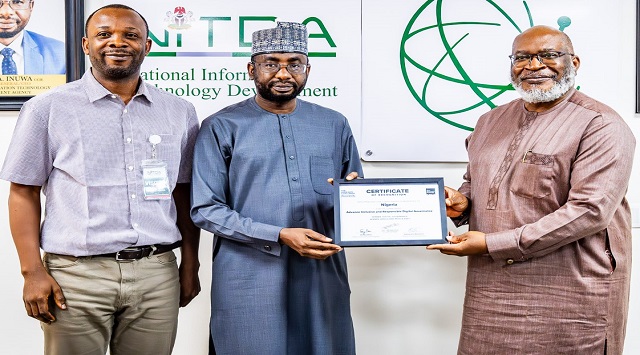News
NigComSat Corporation Bill Rings Controversy

Industry experts have said that autonomy for Nigerian Communication Satellite Limited (NigComSat) was an invitation to failure and creation of another white elephant destined to go the way of the now moribund, Nitel, Nigeria’s beleaguered national carrier.
Failing to find justifiable reasons for the demands of autonomy by NigComSat, the experts said that the passage of the bill amounts to creation of a parallel space agency that will compromise the National Space Programme of the Federal Government.
The experts which gathered in Lagos tore the bill apart and insisted that the passage of the bill will also be a wasteful duplication as the functions of the proposed Corporation are being performed by the Nigerian Space Research and Development Agency.
Dr. Emmanuel Ekuwem, chairman Teledom Group fired the first salvo and cautioned that the bill, when passed, might give NigComSat the autonomy to operate as a business venture and as a regulator.
He noted that government has no business in doing business.
Ekuwem’s comment drew the ire of Timasaniyu Ahmed-Rufai, the chief executive officer of NigComSat who clarified that the bill, in contents, does not have anything to imply that the bill will grant NigComSat a regulatory status as it has no operator to compete against.
“Contrary to the thinking of the business community, government has a business in business,” He added
Ahmed-Rufai also stressed that the bill will build NigComSat into maturity before becoming players like the Intelsat and other global satellite companies owned by the governments.”
He had immediate support from Yele Okeremi , member, Executive Committee of Institute of Software Practitioners of Nigeria (Ispon).
He said: “We must perceive satellite communication as critical national infrastructure which requires everything to protect including legislation and we must sit down to see that we do everything to see that this bill become a law.”
He listed technology, social perception and legislation as the tripod that must be present before a revolution can happen.
Victor Nwakesi , representative of Olisa Agbakoba & Associates, the law firm responsible for the drafting of the NigComSat bill, also explained that the bill is much desired and that passage will aid Nigeria’s emerging development issue.
According to him, the contents of the NigComSat bill have been developed to align with what the laws allow. “NigComsat should be protected in the best interest of the citizens,” he said.
Eng. Lanre Ajayi, president, Association of Telecoms Companies of Nigeria and chairman of the occasion, noted that there was a need to guide the Senate, as citizens, to let them know the need for Satellite Company to be able to run businesses on its own with less government bureaucracy.
Ajayi noted that satellite technology is a very desirable technology in Nigeria, noting however, that this was not to say that other terrestrial technologies are not very relevant but they are complementary.
“The major advantage of satellite is its ubiquitousness. In a country like ours, where we have many rural communities, satellite becomes an option. If we must progress, we cannot run away from developing satellite technology and government must support this.” Ajayi
He, however, expressed the view that NigComSat might go the way of Nigerian Telecommunications Limited, “because with the Act, it appears we are now putting it in the hands of the law makers.”
However, Bayo Banjo, president, Nigeria Internet Group, affirmed that the bill will transform NigComSat to a fully-owned government company.
“I do not see a reason for this bill because the company is already a limited liability. The bill is not in the interest of Nigeria. It will not serve the purpose of Nigerians.” Banjo noted.
He submitted that rather than having the NigComSat bill passed, it should be jettisoned with the best option to have it privatised.
Ben Nwaroh, partner, Crimson Partners Barristers and Solicitors stood up to say that the proposed bill is contrary to the new national ICT policy approved by the federal executive council.
Ahmed-Rufai sharply shouted him down in a desperate move to starve off further attacks on the bill.
He disclosed that the bill seeks to establish an Act to establish the NigComSat Corporation empowered to engage in, purchase and otherwise acquire or take over the assets, business, company, firm or persons and act in furtherance of all and any business associated and or relating to the satellite industry.
The bill has already been passed by the lower legislative arm, the House of Representatives as at March 2012.
The bill is now set for deliberation at the Senate before it will eventually be sent to the president for assent and the bill becoming an Act.
Ahmed-Rufai, said the Bill, if passed into law, will allow NigComSat Limited to engage in international business partnership for the benefit of the whole country.
He urged stakeholders in the nation’s Information and Communication Technology to support the bill, “as a corporation, the satellite company in about three to four years, would have achieved global satellite coverage.”
News
NITDA Partners OGP to Drive Presidential Digital Goals

The Director General of the National Information Technology Development Agency (NITDA), Kashifu Inuwa, CCIE, has reaffirmed Nigeria’s commitment to open governance, transparency and inclusive digital development as the Open Government Partnership (OGP) team formally presented the award and certificate received at the OGP Global Summit Spain 2025 to the Agency’s leadership.

Nigeria emerged as the overall global winner in the Digital Governance category in recognition of the country’s excellence in deploying digital tools and policies to strengthen government transparency, accountability, and citizen engagement. In addition, Nigeria received the Regional Award for advancing Open Digital Governance across Africa and the Middle East, reaffirming its leadership role in promoting open government principles and driving digital transformation across the region.
These recognitions were largely attributed to initiatives led by NITDA in collaboration with civil society partners, such as Dataphyte, which showcased innovative and inclusive approaches to digital governance at the summit.
The summit, which was organised in Vitoria-Gasteiz, Spain, brought together more than 1,500 high-level representatives of governments, civil society leaders, and policymakers from around the world to exchange experiences, best practices, and progress on open government initiatives and implementation on key issues.
Receiving the OGP delegation at NITDA, Inuwa described the recognition as a national honour rather than an institutional one, stressing that the award reflects Nigeria’s collective efforts across government, civil society and the private sector in advancing open governance principles through the digital space.
According to him, such global recognition comes with heightened responsibility to deliver on commitments made under the OGP framework.
“This is not just about NITDA. It is a national recognition, and every recognition comes with responsibility,” the DG said.
“If we fail to execute the commitments we have made, it will not only affect our image locally but also at the international stage. This is also not something NITDA can do in isolation,” he added.
Inuwa linked the achievement directly to the Renewed Hope Agenda of President Bola Ahmed Tinubu, noting that digital transformation, transparency, economic diversification, job creation and efficient public service delivery remain central presidential priority areas.
He emphasised that leveraging digital technologies to deepen openness and accountability aligns with national objectives of strengthening institutions, improving governance outcomes and building trust between government and citizens.
Highlighting the importance of collaboration, the NITDA boss underscored the role of the OGP platform as a catalyst for a strong multi-stakeholder approach in Nigeria’s digital ecosystem.
He called on civil society organisations, development partners, the private sector and other government institutions to provide technical expertise, guidance and sustained engagement to ensure effective implementation of agreed commitments.
“We need to leverage the OGP platform. We need your expertise, your guidance, your support and your commitment to hand-hold us in delivering on these commitments,” he said.
He further noted that “a multi-stakeholder approach in the digital space is critical to fostering a resilient ecosystem that delivers real value to citizens.”
Inuwa disclosed that NITDA has already begun internal reviews of its OGP commitments and has tasked its representatives, including Dr Rousseau, to work with colleagues to develop a clear execution strategy.
He proposed the creation of joint work streams with OGP stakeholders to support implementation, ensure accountability and keep all parties on track.
“We are humans. Oversight and collaboration help us stay focused. With commitment, nothing is impossible, and I believe these goals are achievable,” he added, assuring the delegation of NITDA’s readiness and political will to deliver on all agreed commitments.
Inuwa also welcomed the idea of engaging the political leadership of OGP, including the Honourable Minister of Budget and Economic Planning, with a view to briefing President Tinubu on the achievement. He noted that celebrating milestones is important, as it reinforces morale and demonstrates that Nigeria’s efforts in digital governance are gaining global recognition.
“It’s also good when there are wins, we should celebrate, because we too never knew that the little things we are doing are noticed not just within Nigeria, but globally, to the extent of earning us this award,” he asserted.
He concluded by expressing gratitude to the Nigerian National OGP Secretariat and the global OGP leadership, reaffirming NITDA’s commitment to strengthening collaboration and building a more productive working relationship that will translate open governance principles into measurable national impact.
Earlier in his remark, Mr Olusoji Apampa, who led the OGP deelegation, said the honours were earned through a strong partnership between government and civil society, with NITDA playing a critical role, particularly in commitments focused on improving digital governance in Nigeria.
Apampa expressed hope that the awards would serve as added momentum to deepen ongoing commitments under NITDA’s leadership and accelerate the practical implementation of reforms aimed at strengthening digital governance across the country.
News
PalmPay Launches N400 Million World Travel Carnival, Rewarding Users with Free Global Trips

PalmPay, Nigeria’s leading digital banking platform, has announced the launch of its ₦400 million festive rewards campaign, designed to reward users with cash prizes and fully sponsored international travel experiences for everyday transactions on the PalmPay app.

The campaign will run from December 17, 2025, to January 8, 2026. The campaign is designed to reward everyday transactions with extraordinary experiences. It runs alongside PalmPay’s Purple December brand campaign, which focuses on wrapping up the company’s key brand and community initiatives for the year.
At the centre of the rewards campaign is the PalmPay World Travel Carnival, an interactive card collection experience that allows users to earn city cards by completing transactions on the app. Users are required to collect five city cards – London, New York, Dubai, Sydney, and Cape Town and combine them into a World Card, which unlocks a share of the prize pool.
The more World Cards a user creates, the larger their share of the cash rewards. Any extra uncombined cards can be swapped with friends and other PalmPay users to help complete additional World Cards.
Beyond cash rewards, the Carnival also offers Free Global Trips. In each round, the top two users with the highest number of eligible transactions (₦100 and above) and at least one World Card will win an all-expense-paid international trip.
The travel grand prize covers:
- Visa fees
- Round-trip international airfare
- 5-day, 4-night hotel accommodation
- Side attraction
- Meal expenses
- Airport pick-up and drop-off
- All transportation for scheduled tour activities during the trip
Winners will be determined through a transparent leaderboard system, with prizes credited automatically at the end of each round on December 25, December 31, and January 8.
Participation is simple:
- Complete tasks on the PalmPay app, such as Airtime, Data, Transfers, and other specific transactions listed in the app, to earn cards.
- Collect all five city cards.
- Swap cards with friends to complete your collection.
- Combine cards to form a World Card and earn cash rewards.
- Perform more transactions to climb the leaderboard for a chance at the global trip prize.
To ensure fairness, PalmPay has instituted strict rules: no cheating, bots, fake accounts, or manipulation. Any violations may lead to disqualification or account bans. Additionally, the Free Travel Prize is limited to one per user throughout the campaign.
Speaking on the launch, Femi Hanson, Head of Marketing & Communication, “This festive rewards campaign is about turning everyday banking into meaningful value for our users. With the World Travel Carnival as the headline activation, we are reinforcing PalmPay’s promise of being the smarter way to bank—where smart financial decisions unlock bigger opportunities.”
News
REA, NBS Partner to Deliver Comprehensive Energy Data for Nigeria

The Rural Electrification Agency (REA) and the National Bureau of Statistics (NBS) have signed a Memorandum of Understanding (MoU) to conduct a nationwide energy survey aimed at closing long-standing data gaps in Nigeria’s power sector. The initiative is expected to guide policy, attract investment, and accelerate universal electricity access.

Signed in Abuja, the agreement establishes a National Energy Survey based on the Multi-Tier Tracking Framework (MTF), a globally recognized methodology that measures electricity access not only by grid connection but also by quality, affordability, reliability, and usage of electricity and clean cooking solutions.
The survey will be implemented under the Energy Sector Management Assistance Program (ESMAP) of the World Bank. Dr. Abba Aliyu, REA Managing Director/CEO, said the partnership underscores REA’s commitment to evidence-based rural electrification planning and will generate detailed insights on electricity access and off-grid solutions nationwide.
Prince Adeyemi Adeniran, Statistician-General of the Federation/CEO of NBS, emphasized that reliable statistics are essential for effective policymaking, assuring that NBS will provide technical oversight, sampling expertise, and quality assurance to meet global standards.
The survey will assess energy access, household affordability, expenditure patterns, and the adoption of off-grid technologies such as solar home systems, mini-grids, and clean cooking solutions. REA will provide sector expertise and policy alignment, while NBS manages regulatory approvals, methodology, and technical supervision.
Funded and technically overseen by the World Bank, the exercise will run for 18 months, with the resulting data expected to improve national energy planning, programme targeting, and private sector investment, particularly in underserved and rural communities.
Officials said the collaboration reflects the Federal Government’s commitment to strengthening inter-agency coordination, enhancing energy data availability, and advancing Nigeria’s goal of universal electricity and clean cooking access.

 E-Business2 days ago
E-Business2 days agoNigeria Police Arrest Okitipi, Nigerian Allegedly Linked to Microsoft 365 Hack

 E-Financial2 days ago
E-Financial2 days agoWorld Bank to Approve $500m Loan for Nigeria Today

 News2 days ago
News2 days agoNITDA Partners OGP to Drive Presidential Digital Goals

 E-Financial2 days ago
E-Financial2 days agoCustoms Slam 3 Percent Surcharge on Banks over Delayed Revenue Remittance

 Telecom2 days ago
Telecom2 days agoWhy Econet Wireless is Switching to VFEX

 E-Financial2 days ago
E-Financial2 days agoFidelity Bank Boosts Maternal, Child Healthcare @ESUTH

 General News1 day ago
General News1 day agoJumia Kicks Off December Holiday Sale, Bringing Festive Deals to Shoppers Nationwide

 E-Financial1 day ago
E-Financial1 day agoAccess Holdings Shareholders Approved to Raise N40bn Capital Through Private Placement

























